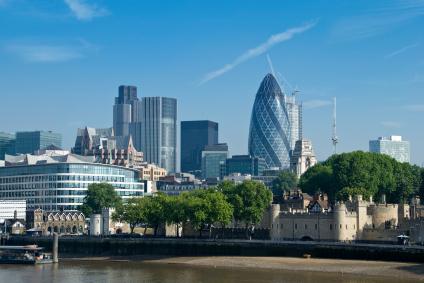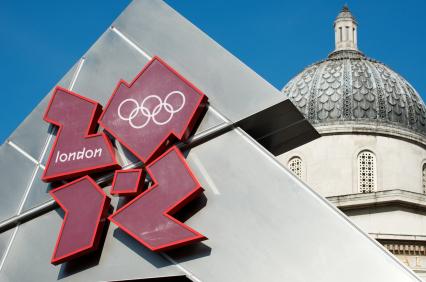
The last time that Britain hosted an Olympic Games was 1948 when the organisers had a post-war austerity budget of just £750,000 which generated a modest profit of £30,000. London 2012 is taking place against a similarly gloomy and austere economic backdrop but there are far greater concerns about whether the investment of around £9 billion will generate a positive return for the London Organising Committee of the Olympic and Paralympic Games (LOCOG). Not just for the local area of East London which is one of the most deprived in Europe, but also for the wider economy.
The disparity in spending between the two London Games is striking – 0.01 percent of GDP in 1948 compared with 0.7 percent in 2012. If you take an additional £2 billion of government spending on enhanced security into account, London 2012 will cost the equivalent of Britain’s total GDP in 1948. So will that significant investment deliver a decent return, lift national morale and possibly even lift the U.K. economy out of recession?

Artfully vague economic data
The prime minister was however artfully vague on exactly where that economic benefit was going to come from. Hardly surprising considering that he now has to justify the viability of a massive infrastructure project that he inherited from a government who bid for the Games when the economy was buoyant rather than in a double-dip recession. Perhaps the words of the former Minister for the Olympics, Tessa Jowell, had come back to haunt him. In 2008 she said, “Had we known what we know now, would we have bid for the Olympics? Almost certainly not!”
In the run-up to the Games a whole host of organisations have been coming out with optimistic predictions for the Games and it is worth issuing a health warning here. Many of the more bullish forecasts come from sponsors who may be seen to have a vested interest in talking up the wider macroeconomic benefits of the Games since they will be reaping significant gains themselves as corporate sponsors.
The multiplier effect
Official credit card company Visa predicts that both the both the Games and the Paralympics will generate £804 million in consumer spending this summer, which, with the multiplier effect, could be worth as much as £1.2 billion in spending. Foreign visitors are expected to spend nearly 18 percent more than in a non-Olympic year. But Visa doesn’t factor in a drop in domestic consumption as Londoners go abroad to avoid the Games and businesses take a hit from the severe disruption caused in London during seven weeks of the Games. From 2013 to 2015 Visa is predicting an ongoing economic boost worth £4.12 billion – some way short of recouping the £9 billion investment.
Goldman Sachs predict a short term boost to the economy of 0.3 percent to 0.4 percent in Q3 – enough to perhaps temporarily lift the U.K. out of recession. The report’s author, Kevin Daly is more circumspect about the long-term benefits. Although he reckons that over time the £9 billion investment in the Games will be recouped by sales of land and other Olympic facilities, there is as yet no reliable estimate of the likely proceeds.
Tangible and intangible multiplier effects
According to Sir Martin Sorrell, CEO of the world’s biggest marketing services group and unofficial strategy advisor to LOCOG, the 2012 Games have already generated a billion pounds in sponsorship – significantly more than the £750,000 in the original budget. “If you look at the infrastructure legacy impact on East London and if you look at the emotional benefit, we’ll see a positive tangible benefit as well as an intangible benefit. This is not just a science it’s an art too.”

There is already anecdotal evidence emerging from U.K. companies that the emotional benefit of the Games is already providing an unexpected boost to consumer spending. Simon Longbottom is a managing director of U.K. brewer and drinks company Greene King and he is convinced that the Olympic and Jubilee effect has significantly turned round the national gloom over the recession and the dire summer weather. “We were quite surprised to see turnover increase three or four times in pubs in towns where the Olympic Torch was passing through."
Commercial gateways to the Olympics
Westfield shopping centre is the official Gateway to the Olympic Park through which 70 percent of the 10 million visitors to the Games will have to pass. This is expected to give a significant boost to the 250 shops and 70 eateries on the largest urban shopping centre in Europe. Myf Ryan is Westfield Stratford City’s general manager marketing U.K. and believes the regeneration round the Olympic Park will have a positive and lasting economic impact. ”We’d decided to invest in this area before London was chosen because we saw the potential for redevelopment of the area.” The £1.75 billion project employed 27,000 during the construction phase and will employ 18,000 people when the scheme is fully built out.

Overprotective protocols
The problem for many of those companies who built the Games is that they had to sign a “no marketing rights protocol” which prevents them from publicising their link to the Olympics. The protocol is designed to protect the official sponsors’ interests but many business leaders (including Sir John), claim the overprotective approach by LOCOG is damaging business prospects.

Lance Morgan’s family-owned fish smoking firm was one of 250 small businesses displaced by the Olympic Park. He acknowledges that the original business would have been better had they not been moved, but he is confident that the Olympics will drive growth in new areas of operation. They’ve diversified into high-end events and catering and have opened a restaurant and art gallery. “We‘re situated just across from the stadium so for the six weeks of the Games we’ll be the most famous fish firm in the world. People will like what they see and will keep coming back after the Games.”
But Lance Morgan’s economic optimism for his business is in spite of, rather than because of support from LOCOG. He believes that in their enthusiasm to protect corporate sponsors’ brands they are preventing other companies from sharing in the Olympic dividend. “LOCOG have not encouraged people. They haven’t given a road map to corporate Britain on how to get involved and get excited about the Games. All the goodwill they hoped to achieve could turn into bad will.”
A 2012 Games report from ratings agency Moody’s predicts that the Gold medal winner will be the corporate sponsors who have paid just a billion pounds for the privilege. Overall, Moody’s believe the Olympics are unlikely to provide a substantial economic boost to the U.K. economy in 2012, which makes the £9 billion investment by the U.K. tax payer look less successful than the last austerity games in 1948.
When Wolff Olins developed the original brand and logo for the 2012 Games they wanted to create a brand that would be “like no other” so that everyone could share in the beneficial effect of the Games – “taking the Games from the podium to the people”.
“A narrow focus on the economic costs misses the point,” says Goldman Sachs’ Daly. “Perhaps the most important ‘bottom line’ is that over the past ten Olympics the host nation has won 54 percent more medals than it has in non-hosted Games.” Using an econometric model, Goldman Sachs predicts that Great Britain will come third in the medals table with 30 Gold medals. It remains to be seen whether the “feel-good factor” will translate into economic growth. But… “If medals are your preferred currency this represents a high ROI.”
-
View Comments
-
Leave a Comment




No comments yet.